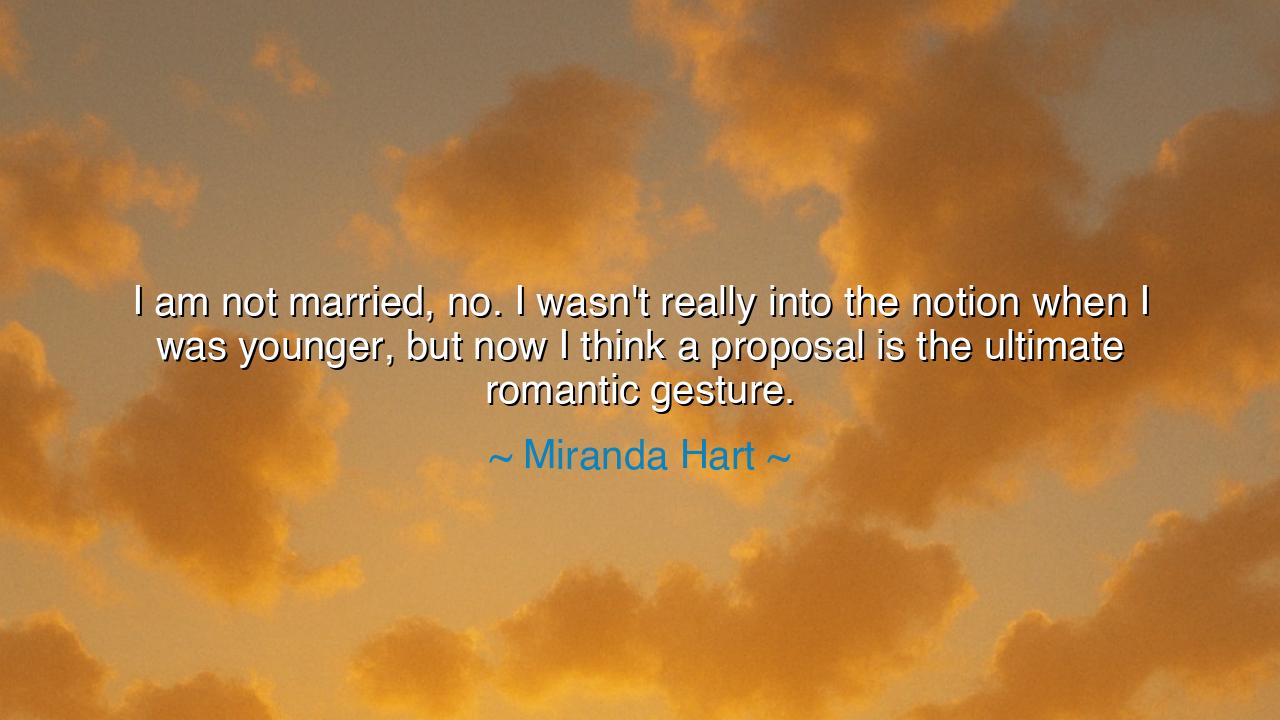
I am not married, no. I wasn't really into the notion when I was
I am not married, no. I wasn't really into the notion when I was younger, but now I think a proposal is the ultimate romantic gesture.






Gather round, my children, for there is a lesson to be learned from the words of Miranda Hart, a woman whose heart has traveled the winding paths of romance and reflection. She spoke these words with the clarity of one who has lived a full life, experienced both the innocence of youth and the wisdom of age: "I am not married, no. I wasn't really into the notion when I was younger, but now I think a proposal is the ultimate romantic gesture." These words, though simple in their form, hold within them the very essence of growth, change, and the evolving nature of love.
In youth, we are often eager to dismiss the things of life that seem burdensome or unnecessary. The notions of marriage and commitment, of vows and promises, can seem far away, like distant stars, too heavy to reach for in the bloom of youth. Miranda, like many of us, found the idea of marriage something to be questioned, not readily accepted. The world, in its youthful arrogance, often convinces us that we are free to choose our own path, to reject what seems conventional, and to embrace the wild winds of independence. But what Miranda teaches us in her words is that there is wisdom in maturity, a wisdom that comes from seeing the world through a fuller lens. The proposal, once viewed as a mere social contract, becomes, over time, the symbol of something far more profound—a gesture of devotion and commitment.
Consider, my children, the tale of Catherine of Aragon and Henry VIII. Their marriage, once a grand union of power and politics, began with the passion of youth, the hope of eternal love. But as the years passed, the nature of their bond changed. What was once a political alliance became a battle for love and legacy. Henry’s proposal to Catherine was not just a formality; it was a commitment, a vow to honor her before God and the realm. But as the years wore on, the meaning of that proposal shifted, showing that love—in its purest form—requires the sacrifice of one’s ego, one’s independence. Henry’s rejection of Catherine later on, though born from his own desires, reflected the deep truths of human nature—that love is never stagnant, and that we must continually renew our vows to one another.
So, too, do we find in Miranda’s words a reflection of the deeper truths of life: that the ultimate romantic gesture is not merely a proposal of marriage, but the willingness to commit, to share your life with another, to offer your heart as a gift. Proposals, in their purest form, are not just about the exchange of rings or words. They are about the willingness to make oneself vulnerable, to offer up your future, and to share the deepest parts of your soul with another. It is this sacrifice, this leap of faith, that makes the proposal the ultimate symbol of romantic devotion.
In this light, my children, we must also reflect on the story of Joseph and Mary, the humble couple whose love and commitment changed the course of history. Joseph’s decision to marry Mary, despite the scandal that surrounded her, was not just a cultural or religious act; it was a romantic gesture of the highest order. His proposal, though unspoken, was a vow to stand beside her, to raise her child as his own, and to embrace the challenges of life with love in his heart. What Joseph teaches us is that true romance lies in sacrifice, in standing by the one you love, even when the world would have you turn away.
So, my children, what lesson can we take from these reflections? It is this: love grows and changes with time, and so too must our understanding of what it means to be committed to another. In our youth, we may look upon proposals as mere formalities or social customs, but as we grow, we begin to see them for what they truly are: the ultimate romantic gesture, a declaration of one’s heart, a promise to stand by another through all the seasons of life.
Thus, I urge you, dear children, to honor love in all its forms. Do not rush to reject the things of the heart simply because they seem too binding or restrictive in youth. Know that love is a living thing, ever-changing, ever-growing. And when the time comes for you to give of your heart, whether in marriage or commitment, let your gesture be one of deep devotion, for it is through such acts that we learn the true meaning of sacrifice, trust, and romance. So may you walk forward with the understanding that love, in its truest form, is not a fleeting feeling, but a choice—a proposal—that is renewed again and again throughout your life.






AAdministratorAdministrator
Welcome, honored guests. Please leave a comment, we will respond soon